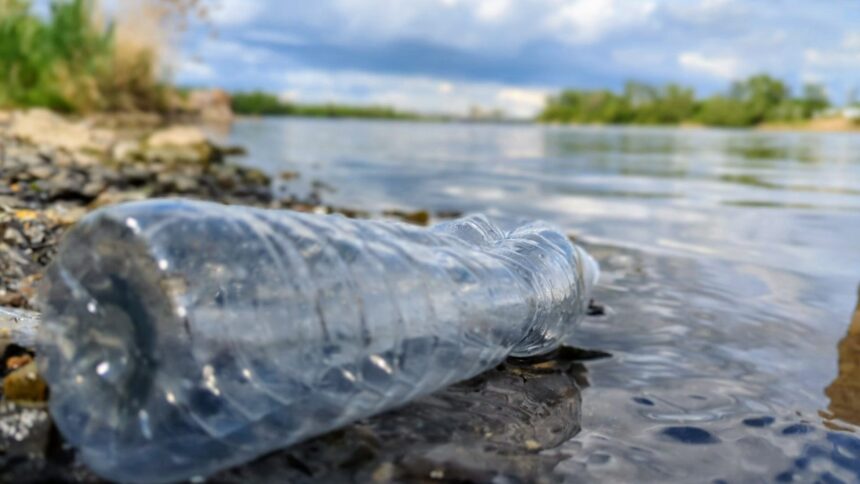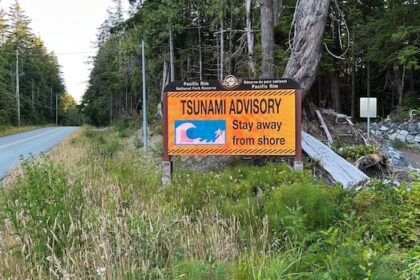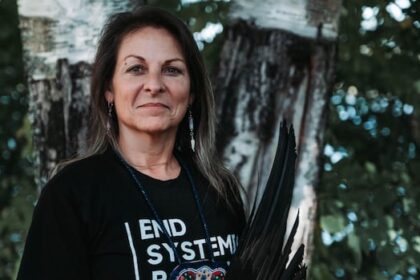The race in Geneva to hammer out a United Nations global plastics treaty to reduce plastic waste in the environment is nearing the end and Indigenous Peoples involved are not very optimistic about the outcome. “So far, things have been going in circles with ambition lowering,” wrote Lynn Konwaia’tanón:we’s Jacobs in an email to APTN News on Aug. 11. “It could go either way – very very badly or they could come up with an acceptable treaty. Jacobs is Kanien’kehá:ka (Mohawk) from Kahnawake and is currently doing Ph’D research on plastics and colonialism at McGill University in Montreal. She is in Geneva as part of the International Indigenous Peoples’ Forum on Plastics (IIPFP), an independent group of Indigenous experts and representatives working to uphold Indigenous rights and advocate for solutions to plastic waste at the UN Global Plastics Treaty process. “We are disappointed in the absence of meaningful references to and affirmation of the rights of Indigenous Peoples with the Chair’s text, and propose immediate action to address this critical oversight,” said Abraham Francis, an IIPFP representative who addressed the UN intergovernmental negotiating committee on Aug. 5. In December 2024, negotiations concluded in South Korea without an agreement and the draft version of the treaty removed references to the UN Declaration on the Rights of Indigenous Peoples, or UNDRIP. “My guess is they were just trying to streamline the (draft) texts as far as possible and get out any sources of disagreement in there,” said Karen Wirsig, the senior program manager on plastics with Environmental Defence, a Canadian environmental advocacy organization, who is in Geneva observing the negotiations. “I mean, it’s just shocking given that there’s the UN Declaration on the Rights of Indigenous Peoples. This is a UN process and you’re going to strip out all references to the rights of Indigenous people? Like, wow, shocking.” Members of the International Indigenous Peoples’ Forum on Plastics (IIPFP) in Geneva. Photo courtesy: Dylan Kava | PICAN However, Canada presented a proposal on Aug. 12 to put UNDRIP language back in to the treaty. “Really happy to see it go forward; to have been involved in the process and then to see Canada put it forward for all parties to consider,” said Kelsey Scarfone, a senior policy adviser with the Métis National Council who is part of the Canadian delegation in Geneva. The Assembly of First Nations and the Inuit Circumpolar Council are also on the ground advising the Canadian government in its negotiations. Jacobs of the IIPFP, however, said that as of Aug. 12, “We are not allowed in most meetings now.” In addition to wanting UNDRIP embedded in the plastics treaty, the IIPFP is also urging for the treaty to; uphold their distinct status as rights holders and avoid any unnecessary conflation with other groups who may be stakeholders; ensure the full participation of Indigenous peoples by providing reliable financial support to attend future meetings and address the full lifecycle of plastics, starting from extraction of the fossil fuels that create plastic to waste management of discarded products. 350 million tonnes of plastic thrown out every year Meanwhile, a draft of the treaty released Wednesday didn’t commit to limiting plastic production or addressing chemicals used in plastic products. Instead, it’s centered on proposals where there’s broad agreement amongst countries — such as reducing the number of problematic plastic products that often enter the environment and are difficult to recycle, promoting the redesign of plastic products so they can be recycled and reused, and improving waste management. Scientists estimate more than 350 million tonnes of plastic are thrown out every year. Less than one-tenth is recycled and more than one-fifth ends up in the environment, where it is harmful to people and all forms of nature. While plastic can be broken down to microscopic levels, it never completely dissolves and can get into soil and water supplies. “Our land and our waterways are not commodities, they are our relatives,” said Samantha Jack of Global Indigenous Youth Caucus in a statement. “The plastics crisis is devastating our sacred relationships with the land,” added Jack, who is from the Nuu-Chah-Nulth and Yale First Nations in British Columbia. Jacobs is Kanien’kehá:ka (Mohawk) from Kahnawake and is currently doing Ph’D research on plastics and colonialism at McGill University in Montreal. Photo: Tom Fennario/APTN. In 2020, Canada produced more than 7.1 million tonnes of plastic and only five per cent of it was recycled material. Almost five million tonnes of plastic ended up as waste, with less than 10 per cent of it recycled. The Aug. 13 draft treaty asked nations to make commitments to ending plastic pollution, rather than imposing global, legally-binding rules. A new draft is expected Thursday, the 10th day of negotiations on what is the sixth time nations are meeting. The talks — involving representatives from 184 countries and more than 600 organizations — are likely to conclude Friday. Andreas Bjelland Eriksen, Norway’s minister for climate and the environment, said the current text is unacceptable and the country’s representatives won’t leave Geneva with “just any treaty.” Norway is helping to lead a coalition of countries called the High Ambition Coalition that want a comprehensive approach to ending plastic pollution, including reducing production. “We are going to be flexible, but at the same time ambitious in our positions, and work with every single hour that we have left to bring this to a conclusion, a positive conclusion, because the world needs a plastics treaty now.” Eriksen said he’ll stay “cautiously optimistic” until the bitter end. Meanwhile, powerful oil and gas-producing nations and the plastics industry oppose production limits. They want a treaty focused on better waste management and reuse. They have raised different concerns with the draft text, saying it doesn’t have the scope they want to set the parameters of the treaty or precise definitions. Read More: Sacrifice Zones: Life along the fenceline between the land and industry For her part, Jacobs found herself at a meeting with members of the UN negotiating committee on Aug. 9 to celebrate the International Day of World Indigenous Peoples. There she delivered the Ohénton Karihwatéhkwen, which translates to “the words that come before all else” an opening speech that traditionally starts off Kanien’kehá:ka events by giving thanks to the creator, the environment, animals, and ancestors. Throughout the Ohénton Karihwatéhkwen, there is a recurring refrain “Tho káti naióhton nonkwa’nikòn:ra”- “and now our minds are one”. It’s an appropriate phrase for high powered negotiations and a call to build consensus. It also serves as a challenge- because as the deadline for a global plastics treaty looms, it would appear that many minds are not as one. With files from The Canadian Press Continue Reading
Indigenous groups pushing for UNDRIP to be Included in global plastics treaty

Leave a Comment










